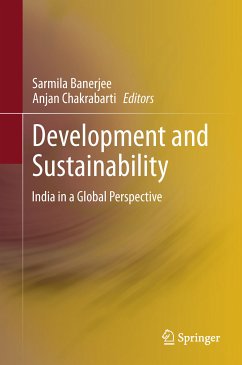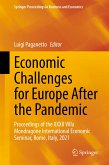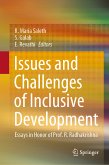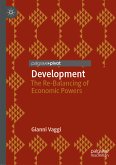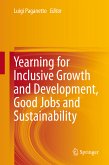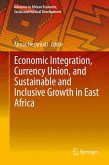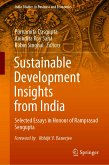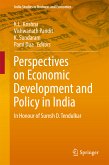Following the reforms undertaken in the last two decades, India's economic landscape has been radically transformed. This book examines the new economic map, which is shown to be shaped by two intertwined currents: globalization and sustainability. Weaving extensively through these currents and the canvas of development in the Indian economy they open up, this work seeks to introduce new methodologies, a corpus of concepts and modes of analysis to make sense of the emerging order of things. What transpires in the course of the investigation is a critical reflection of the present in which not only the new institutions, policies and practices are analyzed, but their limitations, fragility and at times myopic approaches are brought to light. By highlighting the rough edges created by the new conditions, this book is firmly engaged with the frontier of the Indian economy and ends up challenging many well-known conjectures and assumptions. In doing so, it strives to shift the Indian economy to a new terrain, thereby fundamentally re-locating and re-orienting the discourse of that economy as a unique object of analysis.
Dieser Download kann aus rechtlichen Gründen nur mit Rechnungsadresse in A, B, BG, CY, CZ, D, DK, EW, E, FIN, F, GR, HR, H, IRL, I, LT, L, LR, M, NL, PL, P, R, S, SLO, SK ausgeliefert werden.
"The essays in this volume, which study a very wide range of different aspects of the Indian economy, provide an exceptionally rich intellectual fare to the reader. They yield numerous insights and are uniformly stimulating irrespective of whether one agrees with all the arguments and conclusions. The editors, Professors Sarmila Banerjee and Anjan Chakrabarti, deserve our gratitude for this very valuable collection of essays on the Indian economy." Prasanta K. Pattanaik Professor of the Graduate Division, Department of Economics, University of California, Riverside "The Indian economy has entered a new liberalized regime of development following the unprecedented economic crisis of 1991. This edited volume offers a stimulating discussion on some major developments observed to have taken place in the economy during the first two decades of the post-liberalization era, with a focus on the associated sustainability issues. The individual papers of the volume deal with a variety of topics in areas of role of the state, integration of Indian markets with their global counterparts, emerging issues in agriculture, infrastructure and industry, social sector development, resource and environment, and finally, exclusion and social security, which are based on careful researches that have used up to date data and methodology, as required. These papers have drawn important conclusions which may induce a new perspective of viewing the Indian economy that has been emerging. This volume should therefore be a valuable reading for those interested in the study of Indian economic development and, in particular, for M. Phil and Ph. D. students of universities, as guidance for their research on Indian economic issues." Dipankor Coondoo Retired Professor of Economics, Indian Statistical Institute Honorary Visiting Professor, Institute of Development Studies Kolkata
"The edited volume under review focuses on the changing contour of the Indian economy while globalization and sustainability were selected as the two points of entry. ... The volume will prove to be a treasure trove for sincere readers of the Indian economy as well as for researchers keen on picking up new techniques or interested in deriving distinct analytical insights." (Sarmishtha Sen, Journal of Economics and Political Economy, Vol. 2 (3), September, 2015)
"The essays in this volume, which study a very wide range of different aspects of the Indian economy, provide an exceptionally rich intellectual fare to the reader. They yield numerous insights and are uniformly stimulating irrespective of whether one agrees with all the arguments and conclusions. The editors, Professors Sarmila Banerjee and Anjan Chakrabarti, deserve our gratitude for this very valuable collection of essays on the Indian economy."
Prasanta K. Pattanaik
Professor of the Graduate Division,
Department of Economics,
University of California, Riverside
"The Indian economy has entered a new liberalized regime of development following the unprecedented economic crisis of 1991. This edited volume offers a stimulating discussion on some major developments observed to have taken place in the economy during the first two decades of the post-liberalization era, with a focus on the associated sustainability issues. The individual papers of the volume deal with a variety of topics in areas of role of the state, integration of Indian markets with their global counterparts, emerging issues in agriculture, infrastructure and industry, social sector development, resource and environment, and finally, exclusion and social security, which are based on careful researches that have used up to date data and methodology, as required. These papers have drawn important conclusions which may induce a new perspective of viewing the Indianeconomy that has been emerging. This volume should therefore be a valuable reading for those interested in the study of Indian economic development and, in particular, for M. Phil and Ph. D. students of universities, as guidance for their research on Indian economic issues."
Dipankor Coondoo
Retired Professor of Economics, Indian Statistical Institute
Honorary Visiting Professor, Institute of Development Studies Kolkata
"The essays in this volume, which study a very wide range of different aspects of the Indian economy, provide an exceptionally rich intellectual fare to the reader. They yield numerous insights and are uniformly stimulating irrespective of whether one agrees with all the arguments and conclusions. The editors, Professors Sarmila Banerjee and Anjan Chakrabarti, deserve our gratitude for this very valuable collection of essays on the Indian economy."
Prasanta K. Pattanaik
Professor of the Graduate Division,
Department of Economics,
University of California, Riverside
"The Indian economy has entered a new liberalized regime of development following the unprecedented economic crisis of 1991. This edited volume offers a stimulating discussion on some major developments observed to have taken place in the economy during the first two decades of the post-liberalization era, with a focus on the associated sustainability issues. The individual papers of the volume deal with a variety of topics in areas of role of the state, integration of Indian markets with their global counterparts, emerging issues in agriculture, infrastructure and industry, social sector development, resource and environment, and finally, exclusion and social security, which are based on careful researches that have used up to date data and methodology, as required. These papers have drawn important conclusions which may induce a new perspective of viewing the Indianeconomy that has been emerging. This volume should therefore be a valuable reading for those interested in the study of Indian economic development and, in particular, for M. Phil and Ph. D. students of universities, as guidance for their research on Indian economic issues."
Dipankor Coondoo
Retired Professor of Economics, Indian Statistical Institute
Honorary Visiting Professor, Institute of Development Studies Kolkata

